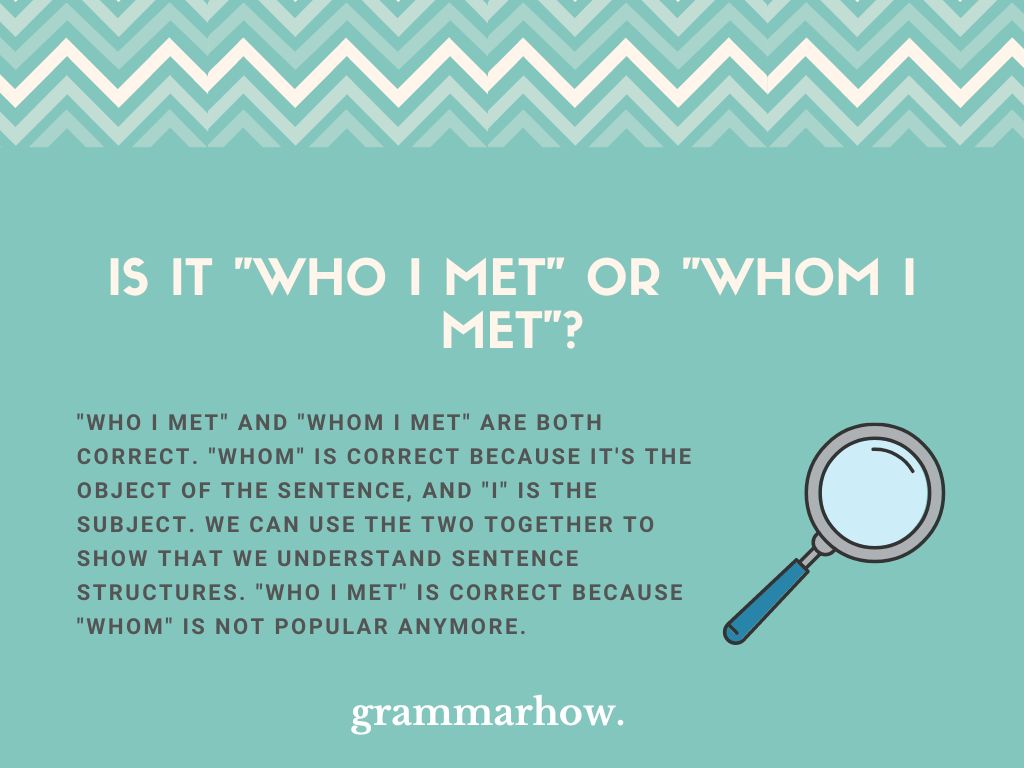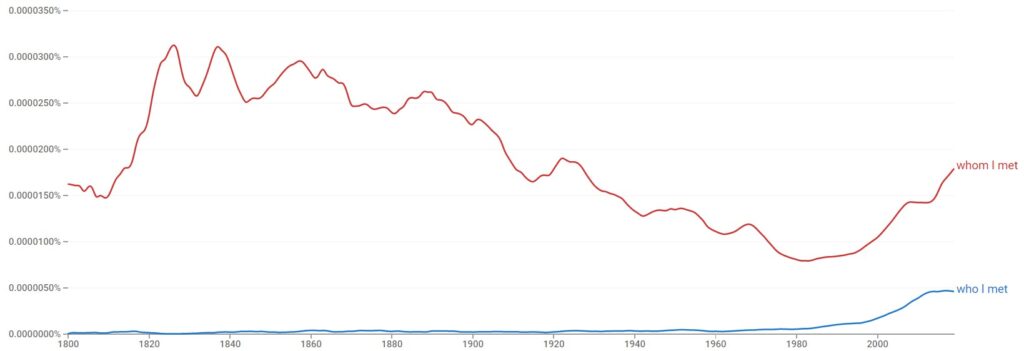“Whom” is one of those old-fashioned words that’s losing popularity in modern times. With the evolution of English, people are starting to remove old-fashioned words for newer, more suited ones. “Who” and “whom” are becoming one in their meanings, and this article will help you with that.
Is It “Who I Met” or “Whom I Met”?
“Who I met” and “whom I met” are both correct. “Whom” is correct because it’s the object of the sentence, and “I” is the subject. We can use the two together to show that we understand sentence structures. “Who I met” is correct because “whom” is not popular anymore.

The funny thing about the English language is that it’s not always about what is the “most” correct phrase. Yes, “whom I met” should be the only suitable choice when you’re writing in this manner.
However, “who I met” is becoming more popular as time goes on. “Who” and “whom” have begun to mean the same thing, allowing “who” to also work as an object in a sentence.
There are no specific rules that state this about “who” either. It has become interchangeable with “whom” because of conceptual choices. Basically, native speakers and writers prefer it to the old-fashioned “whom,” so “whom” is being phased out.
According to Google Ngram Viewer, “whom I met” is still the most popular choice. However, “who I met” is growing much quicker. It started growing rapidly in the 1990s, and it shouldn’t be too much longer before it overtakes “whom I met” as the more popular choice.

Who I Met
“Who I met” works well, but it’s best to stick to writing it informally for the time being. Informal writing allows us to write without considering all the necessary formal rules that make “whom” the better choice.
“Who” and “I” are both subjects, which is why this sentence technically doesn’t make sense. It doesn’t work formally (for now).
- The girl who I met at the party said she’ll be there to see me later. I can’t wait.
- The people who I met along the way are all going to come with me. I want to see them again.
- Ritchie, who I met the other day, said there are a few things that we need to talk about before doing this.
- Samantha, who I met at the rally, has a lot of choice words to say about this matter.
Whom I Met
“Whom I met” works best when using formal language rules. It works because it includes the object “whom” and the subject “I.” This is standard practice when building a correct sentence structure, so it makes sense to stick to it in this form.
Remember, though, “whom” is slowly dying in popularity. Many people avoid using it and think it sounds quite jarring when they hear it aloud.
- The people whom I met at the beach are coming along. I hope you don’t mind that I invited them.
- There are some guys there, whom I met in the town over from this one, and they’re not happy to see me.
- Timothy, whom I met once before, said that he would do all he could to get to this party.
- I will show you the friends whom I met the other day. I hope you’re going to like them as much as I do.
Which I Met
“Which” is another object form, but it’s more general than “whom.” “Whom” only refers to people, while “which” allows us to refer to other things and objects. As long as we can still use the “meet” verb, we can use “which” in the same manner as “whom.”
- The obstacles which I met on my way to work were nothing difficult. I’m glad I conquered them.
- These are all the items which I met on the way to the meeting. I think we need to fix these before it’s too late.
- The timings, which I met with no trouble, were well thought out. Thank you for sorting them for me.
- The issues raised here, which I met with the same exuberance I’m showing off in this meeting, were all fixed.
Final Thoughts
“Who I met” and “whom I met” are interchangeable phrases today. “Whom” is correct and has been used since “whom” and “who” were created as the object and subject in a sentence. However, “who I met” is becoming more popular today because “whom” seems archaic to most.
You may also like:
“To Who” or “To Whom”? Correct Version (With Examples)
Is It “Whom Should I Contact” or “Who Should I Contact”?
“Who to Contact” or “Whom to Contact”? (Correct Version)

Martin holds a Master’s degree in Finance and International Business. He has six years of experience in professional communication with clients, executives, and colleagues. Furthermore, he has teaching experience from Aarhus University. Martin has been featured as an expert in communication and teaching on Forbes and Shopify. Read more about Martin here.
